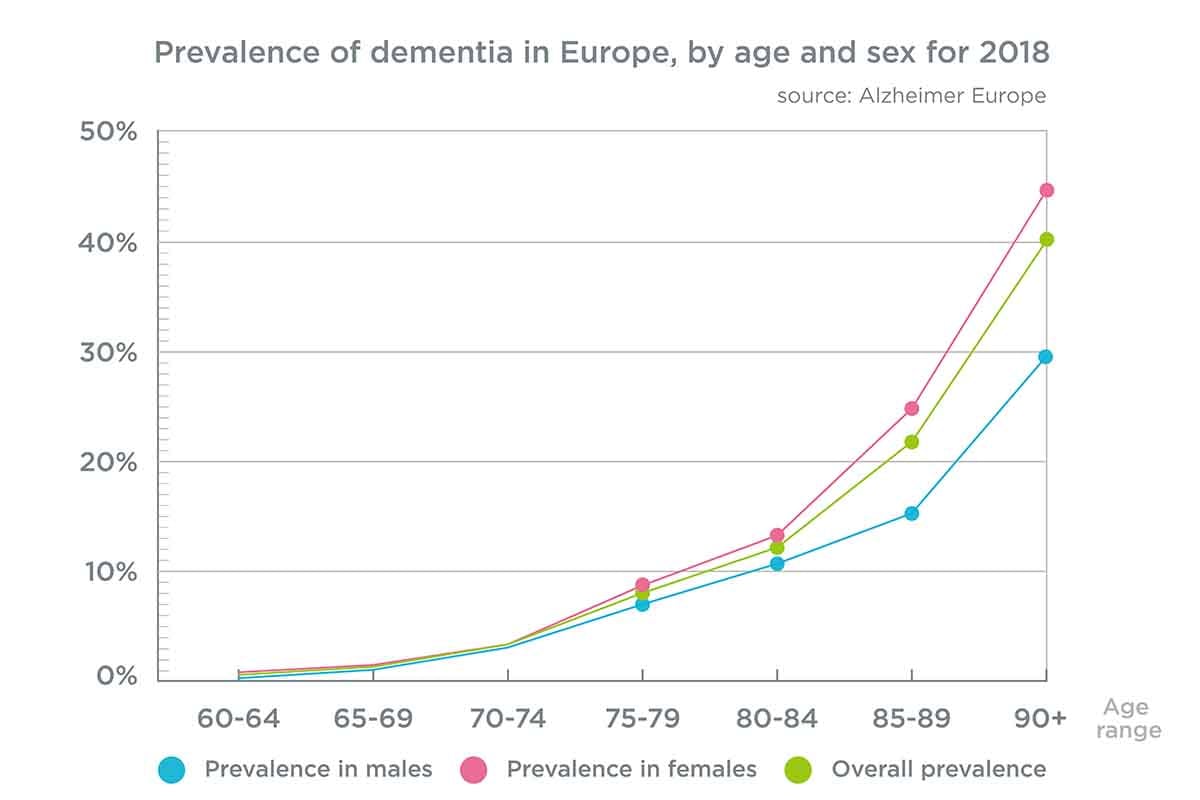
Learn actionable tips for living well with dementia. Get actionable preventive care advice for people dealing with onset dementia symptoms.
What is dementia?
Dementia is a condition described as the loss of cognitive functioning. These are mental abilities that are related to thinking, remembering and reasoning. Dementia alters a person’s ability to carry out daily activities and people suffering from it may even experience personality changes. One of the primary symptoms of the condition is memory loss. Although there are many reasons why a person may lose his memory, memory loss is often attributed to people with dementia, even in the early stages. Alzheimer’s disease is one primary cause of disease in older adults, but there are other causes worth noting. There is no known cure for Alzheimer’s, although the symptoms of dementia may be reversed, depending on the cause.
Symptoms of dementia
Some of the common symptoms of dementia vary, depending on the cause. Here are the most common:
- Memory loss - the person with dementia does not usually know this is happening, and a close loved one might be the first to notice
- Difficulty with spatial and visual abilities - A person with dementia will have trouble understanding certain concepts, and even have trouble finding the relevance of two separate things.
- Struggling with problem-solving or dealing with tough tasks - A person with dementia may struggle with solving a problem when faced with a complicated situation
- Difficulty with planning or organising
- Disorientation and confusion
A person struggling with dementia often experiences psychological changes associated with the disease. As the individual loses cognitive function, they may have difficulty understanding what’s happening in their immediate environment. They also may have trouble recognizing the people close to them. Some psychological changes that a dementia sufferer may experience include:
- Personality changes
- Anxiety
- Depression
- Hallucinations
- Agitation
- Paranoia
- Inappropriate behaviour
What causes dementia?
Dementia is caused by damage sustained to the nerve cells and their connections to the brain. The effects of dementia on people may vary depending on which area of the brain has been affected. Certain diseases have been described as being similar to dementia. Such conditions are those that manifest due to a medication reaction or vitamin deficiencies. These might improve if prescribed with the appropriate diagnosis and treatment.
Prevalence Rate of Dementia in the UK
As the population in Europe ages, there has been a rise in cases of the dementia population in recent years. According to a study by EuroStat, the prevalence rate of dementia sufferers has been steadily increasing. As the life expectancy grows and the British population ages, inversely the incidence rate of dementia sufferers also increases. This is why there is a need to provide emotional support for one that suffers from the disease. A tailored approach for caring for a person with dementia is necessary, as there are psychological factors to consider as much as physiological aspects of the disease that need to be accounted for.

The prevalence rates for each age group, expressed as a percentage for the entire population, and broken down by sex, are shown in the table above as an overview for 2018.


The estimated prevalence of dementia in various nations in 2018 and 2050 is displayed in this section. The 2050 projections are derived from statistics from the United Nation's World Population Prospects and are based on future population projections. In 2018, there were 88,851,01 cases of dementia across all of Europe; by 2050, that number may climb to 16,911,488. In non-European nations, there were 895,577 cases of dementia in total in 2018, with a potential increase to 2,171,758 cases in 2050.
What is a person-centred approach (PCA) to dementia?
A person-centred approach is a method of care and support for people suffering from dementia, taking into consideration their needs and desires.
Treating a dementia patient with love and care
It is quite easy to lose sight of a person struggling with the disease, and quantify them into the illness itself. The person-centred approach for dementia was curated for this specific reason. The method ensures that the person with the illness is the main focus, instead of the condition. It is to ensure that the person struggling with the disease is treated with as much care and respect as the next person.
Dementia care: the-person-centred-approach
Professor Thomas Kitwood was the forerunner in developing the PCA approach, a trailblazer in dementia care in the 1980s. He has since then received many recognitions and awards in the field for his contributions to the practice. The approach has been thought to be effective in helping in the rehabilitation of certain behaviours associated with dementia, including aggression and agitation. Another study in the PCA approach cites that there has been a significant reduction in the incidence rate of dementia who received this particular type of care. A person-centred-approach is deeply rooted in compassion and respect. The person-centred approach recognizes the particular needs of a person with dementia, but would not treat it as different from health care provided to others. It enhances the well-being of everyone.
As the effects of dementia develop, people with it become more vulnerable. This should not be viewed as a ‘lessening’ of personhood. This should not be the case. We should change our perspective in terms of our key caring principles (sense of compassion), rather than change how we apply these principles in the way we provide care and engage with people with dementia and their families.
The most important advancement in Alzheimer’s healthcare is in the people-centred approach, which has given people with the disease more opportunities to live their lives better. There has been a cultural shift in terms of how medical practitioners and healthcare providers have viewed and applied themselves in dementia patient care.
This shift in values has greatly advanced how treatment has been administered. Such as providing symptom management for pain, incontinence or sleep. Advancing strategies have become more elaborate and ethical, allowing those with the disease to gain access to a better means for better occupation, communication and engagement with their health caregivers.
How do I ensure that the dementia care I provide is the PCA way?
The PCA approach has more to do with empathy rather than sympathy. It is important to understand that people with dementia do not need to feel empowered and be given opportunities to live their lives as normal as possible, even with the physical limitations the disease can bring. Some ways you can ensure a person-centred approach is through:
- Ensure that they make their own choices in terms of food selection during mealtime. It’s easier for them to identify which food items to pick if you show them visual representations of what to offer. Offer a meal that they'd most likely want to prepare themselves or one that they particularly enjoy.
- It’s in the finer details - which means, even the slightest change can mean a world of difference. It’s important to keep it simple as you don’t want to overwhelm the person. Just giving them a choice of what to wear in the morning, or which cosmetic item to wear on their face may seem like a little detail in their everyday lives, but it is quite important to make them feel they get to live their lives as normal as possible.
- Give yourself space too - it might be difficult to always stay on top of your game, or stick to the approach. Some find making use of the approach as instinctual, intrinsic or even second nature. However, there is space to improve and there is a learning curve to applying the method. Don’t feel discouraged, consistency is key to improvement.
How important is sleep for people with dementia?
One common challenge for people with Alzheimer’s disease is establishing healthy sleeping patterns. Understanding what contributes to health problems allows people with dementia, so you can provide the help needed to decrease the incidence of such problems.
Common health problems related to dementia
One of the main challenges that older adults face is getting enough sleep at night, but people with dementia have an even more difficult time. Sleep disturbance affects 25% of people with mild to moderate dementia, with 50% of this population suffering from severe dementia. Some of these problems may include excessive sleepiness during the day, and insomnia with difficulty sleeping and staying asleep has been.
People with dementia have been found to wake up in the middle of the night and wake up too early in the morning. People with dementia also often experience a state of confusion, which occurs sometime between late in the afternoon and early in the evening. This is related to a phenomenon called sundowning. Sundowning occurs when a person suffering from dementia wakes up in a state of confusion. Sundowning can cause a variety of behaviours such as aggression, anxiety, aggression or refusal to receive direction. This may also lead to wandering and pacing.
Do people with dementia sleep a lot?
According to Mayo Clinic research, people with dementia do sleep excessively during the day and may suffer from insomnia during the night. Sleep disturbances get exceedingly dire as dementia advances. Because of this, people with dementia need to keep a regular sleep schedule. In order to achieve this, a care provider must develop a plan to eliminate disturbances to prevent interruptions in sleeping patterns.
Sleep Problems Associated with Dementia
Research makes strong connections between dementia and sleep problems. A person with dementia will struggle with establishing regular sleep patterns due to varied reasons. If you are a care provider, or one who cares for a person you love that has dementia, then understanding the causes and how to help them is essential.
Some problems associated with dementia include:
- Lack of ample sleep in the course of the night can lead to disrupted sleeping patterns, eventually increasing the incidence of sundowning
- Sedation drugs increase the risk of confusion and falling, as such a physician will only prescribe sleep-inducing medication for a short period of time or until healthy sleeping patterns have been established.
- Underlying sleep conditions such as obstructive sleep apnea in which case a blockage of the airways occur, and the lungs and diaphragm have to expend double the work in order to get air into and from the lungs. This may even cause the person to stop breathing temporarily.
- Lack of sun exposure can lead to the dropping of serotonin levels which leads to depression or a condition known as SAD (seasonal affective disorder).
- Inadequate sleep can impede the production of prostaglandin, a hormone that controls inflammation. Inflammation is one major cause for chronic pain.
- Dementia patients are prone to erratic sleeping patterns. It is important to create a good sleeping environment to help reduce dementia symptoms. A disruptive sleeping environment includes cluttered sleeping quarters, a crowded room, or stimuli such as loud noises or high-intensity lighting.
- Some medication can aggravate the symptoms of dementia. It is important to consult a physician and heed instructions on how to consume prescription medicine for dementia.
- Research has been stratified in terms of caffeine consumption, as some say that moderate caffeine consumption is okay. Some however suggest that long term consumption of caffeine does increase or aggravate symptoms in Alzheimer’s patients.
Sleep problems have been known to have many causes and it is important to speak with a doctor in terms of addressing sleep problems associated with dementia. However, it is the responsibility of a care provider to create and implement a healthy sleep schedule for a person suffering from dementia.
Dealing with sleep problems
Changing sleeping patterns often are common in older adults, whether a sufferer of dementia or not. Factors that determine changes in sleeping patterns, the duration of sleep and the time spent keeping up at night have been related to ageing. In older adults, the total time for sleep has been found to decrease by about 30 minutes per decade starting in middle age. Here are our tips for dealing with these problems:
- Treat pain and other underlying causes - Chronic pain will help a sufferer sleep, as the absence of pain will create relaxation and set the tone for a good night’s rest.
- Ensure a conducive environment for sleep - Playing soft music, aromatherapy or ensuring Best Bed Climate has been found to improve sleeping patterns and facilitates relaxation
- Healthy amounts of exercise during the day may help with sleep regulation, ensure that you do this early in the day because being excessively tired may cause agitation during the night.
- Getting a healthy dose of sunshine - Have you heard of the song, I’m walking on sunshine? Sunshine has been medically proven to help with depression, anxiety, and even extend one’s life expectancy.
- Establish a proper diet - A proper diet will allow a person with dementia to get the necessary nutrients that help with cell regeneration (that may improve nerve damage), it is important to consult a nutritionist in terms of particular food groups that help with sleep regulation.
- Limit daytime naps - It is important to get rest, however, it is also important to be wary of when to rest. People with dementia may struggle with establishing healthy sleeping patterns because of excessive sleep during the day.
- Regulate the use of stimulants - Stimulants cause the body to go on overdrive, and instead of allowing it to get its much needed time to slow down and pause in preparation for sleep.
- Check side effects for certain medications - Some medicinal treatments for dementia patients have stimulants or diuretics. It may be possible to switch the time when medication is introduced to guarantee that it does not become a disruption for sleep.
Conclusion
Living well with dementia is achievable as long as you have the necessary tools, equipped with adequate information to provide intentional care that is provided with a people-centred approach.
People suffering from dementia should not be treated differently, instead, it is important to identify their pain points and cater to their needs to provide the best care possible.
Take back control of your life and circumstances by not letting your condition take hold of you. Whether you have the condition or caring for a loved one. Be it for dementia preventive care or maintenance, Wellcare’s advice lets you take actionable steps for a restful sleep to achieve a healthier lifestyle. Visit our blog page for more Wellcare health education here.
Our 4WD DWF technology has been extensively helpful in sleep regulation and improving environmental conditions to set the tone for a restful sleep at night. Read About our technology and bid your love-hate relationship with acne goodbye.
Disclaimer
Wellcare products are a temporary source of self-care and should not be used as a means for treatment long-term. Our strategies, methods or products do not replace the advice or treatment of a medical practitioner and should be used with wise consideration of lifestyle, health and personal considerations relevant to the recipient of care. We urge our viewers to seek immediate medical attention when warranted.


.png?width=512&name=united-kingdom%20(1).png)

